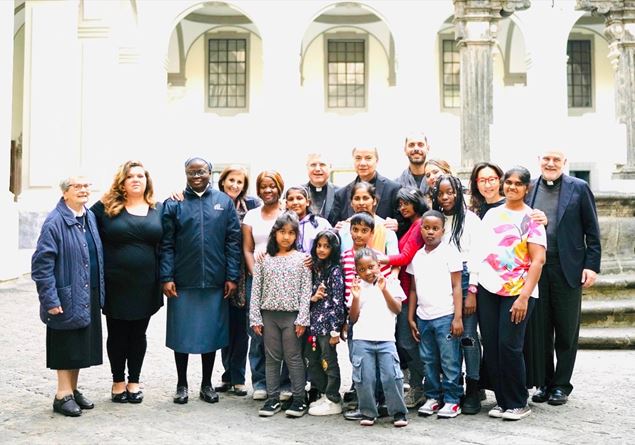
The Women’s Festival, which took place in Naples from 4 to 9 November, addressed the theme of the meeting, highlighting the ability of women to build the bridges necessary to grow a civil and religious community, beyond any discrimination. It celebrated the strength and value of the female figure as a symbol of dialogue and coexistence.
It is important to highlight how the event was not just a series of conferences, but an event enriched by shows and artistic performances, with the aim of making people reflect not only on suffering, but above all on the strength, determination and responsibility of being women in a changing world. The metaphor of Napoli Madre offered a reflection on the value of motherhood as a symbol of welcome for every life.
During the week we were able to reflect and meditate also thanks to the secular prayer to “Mary, Mother of Naples” by the actress and playwright Martina Zaccaro; to the show inspired by Eduardo De Filippo’s masterpiece “Filumena Marturano”, entitled “I sons are sons”, by the Restaur Attori company, where the maternal ability to welcome life without distinguishing between legitimate and illegitimate children forcefully emerged, in contrast with the masculine and patriarchal code. Sister Nunzia De Gori, of the Sisters of Charity of Saint Joan Antide, led a biblical meditation on the evangelical page of Syrophoenicia, which invites Jesus to open his heart to welcome everyone as children of the one Mother God.
In the performance “Mamme with black hands”, foreign women – now considered to all intents and purposes Neapolitans of today – brought on stage, together with Neapolitan mothers, the strength and determination of those who fight for a better future for their children. This action was supported by professionals such as the soprano Ilaria Tucci and Martina Zaccaro, involving a group of mothers from the School of Peace of the Community of Sant’Egidio.
The Festival concluded with an artistic proposal that blends social, cultural and spiritual expressions, through a show that sees women and men reflect together on overcoming gender, with the participation of artists such as the soprano Ilaria Tucci, the actress Martina Zaccaro, the dancer Federica Vacca, the choreographer Janet Park, and others.
The Archdiocese of Naples collaborated with the Laity Sector and the theologian Adriana Valerio, entrusting the artistic care to Mauro Maurizio Palumbo and his Teatro Minimo, known for its commitment to overcoming gender and social issues. Ample space was also given to music, as a universal language that unites different cultures, highlighting their richness.
The Festival saw significant moments such as the meeting between secular and religious communities, with Greek and Sri Lankan dances, and reflections on the Charter of Women’s Rights in the Mediterranean. The concert in the chapel of the Treasure of San Gennaro was touching, where Don Vincenzo De Luca presented music by Hildegarda of Bingen interpreted by the soprano Raffaella Ambrosino and the Ami Ensemble Choir.
The program also included musical performances by the Musica Libera Tutti youth orchestra from Scampia, a neighborhood on the margins but full of redemption initiatives, and a conference on the queens of Naples held by the historian and writer Nadia Verdile. There was also an educational space for female self-esteem, managed by Carla Greco, and guided visits to significant historical places.
The “Women and archaeology” Conference opened an insight into pre-Christian Naples, where women held important roles, still remembered in the Archaeological Museum of Naples. Local schools participated with lessons and workshops on the theme “Against discrimination for a culture of coexistence”.
Finally, the festival saw the meeting of Archbishop Don Mimmo Battaglia with five other Italian dioceses (Catania, Mantua, Palermo, Reggio Calabria-Bova and Verona) to share experiences on enhancing the role of women in the Church, with the signing of the Document of understanding “Sister dioceses. Ecclesial communities online”. It is the first time that different dioceses have united in sorority, a proposal put forward by the women themselves.







